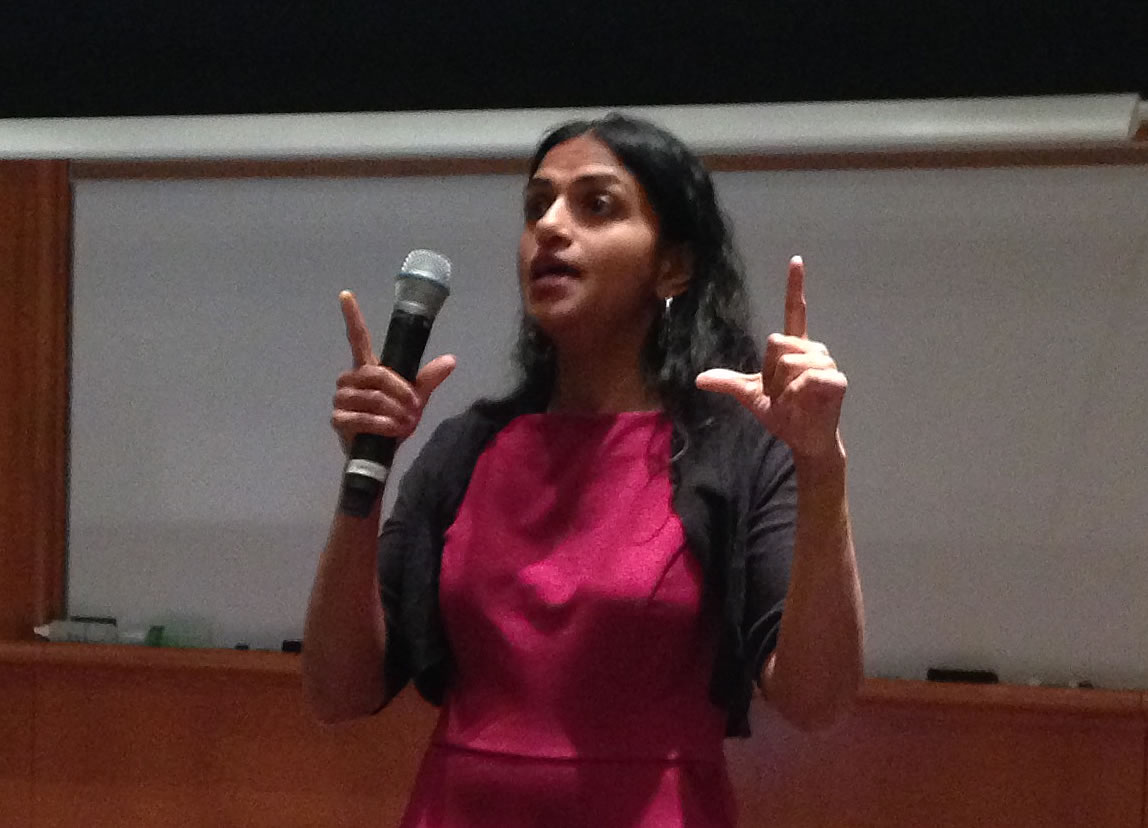

Share
Minneapolis is in the spotlight as elected officials grapple with the question of raising the city’s minimum wage – and workers across the country are watching, a national expert on the restaurant industry said Tuesday.
Saru Jayaraman, co-director of the Restaurant Opportunities Centers United and director of the Food Labor Research Center at University of California, Berkeley, spoke at a public forum hosted by the Carlson School of Management at the University of Minnesota.
She traced the history of tipping and the ways it has contributed to poor wages and working conditions for many hospitality industry workers. And she spoke about the effects of local communities such as Minneapolis instituting their own minimum wages.
“People are rising up in ways all over the country that we haven’t seen in so long,” Jayaraman said. “We need you to continue to lead, to be in the forefront” on issues such as higher wages.
Minneapolis is currently debating a requirement that employers in the city pay at least $15 an hour. Similar movements have swept other cities and states, most recently Maine, where last November voters approved an increase to $12 by 2020.
However, Maine – like 42 other states – allows employers to count tips that employees receive as part of their wages. Minnesota is one of only seven states that bans this practice. The so-called “tip penalty” has arisen in discussions about possible compromises on the Minneapolis wage.
In her talk, Jayaraman made the argument that wages need to rise for all workers – and that tipped workers should not be left behind.
The practice of giving tips can be traced to Europe, where aristocrats bestowed cash on servants as a way of reinforcing social superiority. Some Americans traveling abroad in the 1800s brought the idea back with them.
After the Civil War, the restaurant industry lobbied to hire newly freed slaves and not pay them, forcing them to living on tips from customers. Some Americans, believing that tipping went against the country’s tenets of equality, fought the practice, Jayaraman said. But in 1938, when Congress passed the first federal minimum wage law, it allowed states to set a lower wage for tipped workers.
Today, several states, most of them in the South, hold to the federal minimum wage of $2.13 an hour – which hasn’t been raised in quarter century – and allow workers’ tips to be deducted from this pay.
As a result, hundreds of thousands of restaurant workers get no pay at all and must survive on what they earn in tips. “Even taking tips into account, tipped workers are the poorest workers in America,” Jayaraman said.
Tipping also creates a system ripe for abuse, she said. The U.S. Department of Labor reports 84 percent of employers violate the requirement that they ensure the hourly earnings of tipped workers don’t fall below the minimum wage.
And waitresses, bartenders and other tipped workers – the majority of whom are women – must endure sexual harassment and other mistreatment from customers because they depend on tips to feed their families, Jayaraman said.
There is “a mainly female workforce not getting paid a full wage by their employer … having to put up with the whims of customers … This is not something we ask of any other profession.”
She asked the audience to imagine a world where professors or doctors or lawyers had to depend on tips to survive.
“As professionals, they [restaurant workers] deserve the same wage that every other industry gets,” Jayaraman said.
Restaurant Opportunities Centers United, which Jayaraman co-founded, is working to address the problems of restaurant industry standards from several angles. Formed to help workers who lost their jobs in the wake of the Sept. 11, 2001, terrorist attacks in New York City, ROC United now has 18,000 worker members, 200 restaurant owner members, and 3,000 consumer members in almost a dozen states.
In these regions, workers, employers and consumers are mobilizing for higher wages and race and gender equity through the ‘One Fair Wage’ campaign.
Jayaraman said once restaurant owners know the facts, they can be persuaded to make the move to higher wages and away from a tip penalty. The facts include:
- The restaurant industry is the second largest industry in the United States and the fastest growing;
- Restaurants, particularly large chains such as Olive Garden, are highly profitable, despite stereotypes to the contrary;
- States such as Minnesota that have higher minimum wages and no tip penalty have higher restaurant sales and more robust job growth in the hospitality industry than low-wage states that allow employers to count tips as part of wages;
- Tipping does not disappear in states with no tip penalty but becomes what the customer intended – an expression of thanks, not a subsidy for the employer; and
- Minnesota and other states that don’t count tips as wages have fewer restaurant workers needing public assistance.
Jayaraman’s talk was sponsored by the Center for Human Resources & Labor Studies at the Carlson School and co-sponsored by the Labor Education Service, 15 Now Minnesota, CTUL, MN Neighborhoods Organizing for Change, SEIU Minnesota State Council, ISAIAH and the Minneapolis Regional Labor Federation, AFL-CIO.

